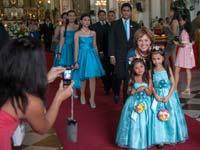“We will have a million new jobs by 2020”

On the final day of her Jobs and Trade Mission to Asia, Premier Christy Clark urged Filipinos to look at B.C. as a strong and stable labour partner.
Premier Clark strengthened the relationship with the Philippines by signing a Joint Communiqué on labour mobility and highlighting the tremendous opportunities and economic partnerships available in British Columbia, such as the new, made-in-B.C. clean-energy facility.
“The Philippines is an economy on the move and we want to ensure that we are able to partner with them for a strong prosperous future,” said Premier Clark.
“Filipinos have long been a key contributor to B.C.’s growth and prosperity. We hope with this new labour Communiqué we can build and strengthen our labour and economic partnership with the Philippines. We will have a million new job openings by 2020 and will need a strong and stable labour partner, and I am proud to join with the Philippines to help meet that need.”
Premier Clark applauded the announcement by Aquilini Renewable Energy that they received approval from the Philippine Economic Zone Authority to build, operate and manage a $15-million waste-to-energy gasification plant in the City of Mactan in Cebu Province.
“Premier Clark, through the BC Jobs Plan, has created an environment to help foster job growth and innovation here in B.C., and it’s working,” said John Negrin, president, Aquilini Renewable Energy. “We’re pleased to announce our first project in The Philippines: a $15-million waste-to-energy recycling facility in the City of Mactan, with excellent potential for further expansion. In addition to creating numerous jobs in B.C. and the Philippines, this project is an excellent opportunity to showcase B.C.’s clean-energy technology and expertise to potential clients in the growing Asia-Pacific market.”
The Aquilini facility will run a recycling centre and waste-to-energy plant processing 45,000 metric tonnes of industrial, medical, and municipal waste per year.
Equipment for the initial phase of the facility will be designed, engineered and manufactured in Vancouver, creating 40 B.C.-based jobs and more to come as the project expands.
In a meeting with Secretary of Labor and Employment, Rosalinda Baldoz, Premier Clark signed a Joint Communiqué on areas of mutual benefits with respect to labour mobility.
Later at a Jobs Fair the Premier connected B.C. employers with recruitment agencies and educational institutions to help fill skilled-worker vacancies in the province.
Premier Clark also met with Secretary of the Department of Foreign Affairs, Albert Del Rosario, to promote British Columbia’s labour market and emphasize strong cultural ties with the Philippines.
“Our first priority is always to find employment for British Columbians, but with so many jobs to fill in the next decade, we know that new immigrants will be key to maintaining the growth of our economy,” said Premier Clark.
Having sufficient numbers of workers to fill jobs in B.C. is a major concern for employers, and immigration is one of the most important avenues to attract workers. Canada Starts Here: the BC Jobs Plan commits to promoting economic development in key sectors and attracting more workers.
Filling existing job vacancies faster will enable employers to operate more efficiently, and allow them to create more jobs for B.C. families.
Premier Clark departed Vancouver May 12, 2012 for the mission to Japan, Korea and the Philippines, following a successful mission last November to China and India.
The jobs and trade mission is aimed at maintaining the province’s strong economic momentum and strengthening relationships with Japan, Korea and the Philippines.
While in Japan, the Premier met with government and business officials to explore opportunities in the natural gas, forestry, technology, and mining sectors.
In Korea, she met with government and business leaders in Seoul and Suwon, with discussions focused on the forestry, international education, technology and clean technology (including bioenergy), mining, and natural gas sectors.
In Manila she met with government officials to discuss ways of addressing labour mobility barriers for skilled workers.
Quick Facts:
• The Philippines is set to become the 16th-largest economy in the world by 2050. (HSBC)
• The Philippines has been one of the top four source countries of temporary foreign workers in B.C. since 2000.
• Since 2010, the Philippines has been B.C.’s second-largest source country for permanent residents.
• The Philippines is our number-one source of Provincial Nominees - 432 in 2011.
• Since 2001 the Provincial Nominee Program has assisted 1,960 skilled and semi-skilled workers obtain permanent resident visas.
What they did in Manila
• The Province of British Columbia and the Republic of the Philippines signed a Joint Communiqué on areas of mutual benefits with respect to labour mobility.
• Aquilini Renewable Energy announced it received approval from the Philippine Economic Zone Authority (PEZA) to build, operate and manage a $15-million waste-to-energy gasification plant in the City of Mactan in Cebu Province.
• The Applied Science and Technologists and Technicians of BC and the Asia Pacific Gateway Skills Table announced the launch of their Training Assessment for Technologists and Technicians Project. The project will pilot a collaborative assessment process for comparing Philippine and Canadian education, as well as training and professional standards in the civil, mechanical and electronics technology occupations.
• Montreux Capital Corp., a BC-based TSX-V company, is acquiring several proprietary banking software assets, including Kowops eCommunity Solutions Phils Inc., a Philippines-based banking software company, in a $1.75-million transaction that will bring modern banking solutions to the underserviced poor in emerging markets.
Leave a comment






